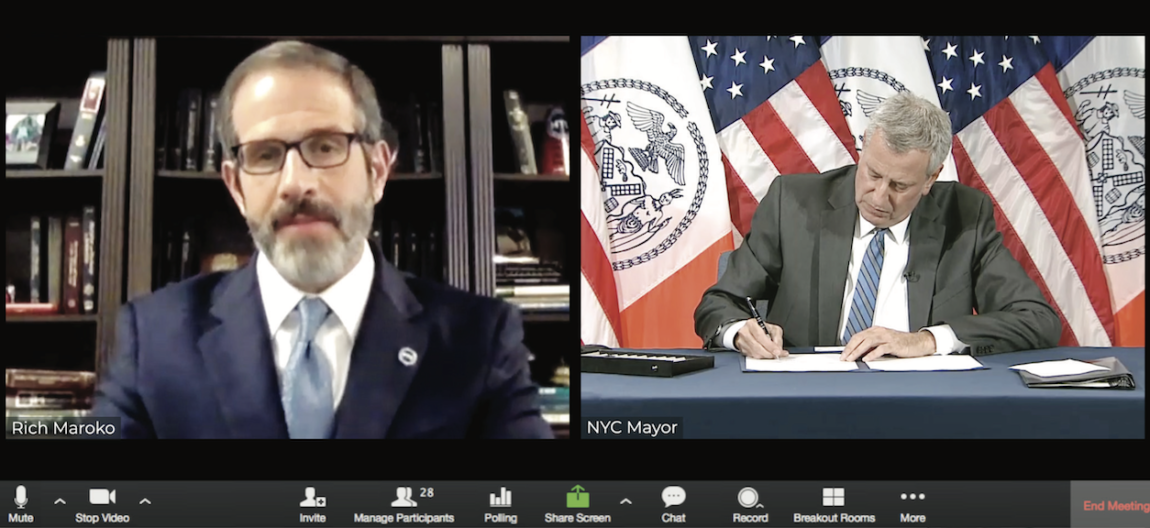A Report from HTC President Rich Maroko

This summer, over 40 housekeeping workers from the Margaritaville Hotel in Times Square ratified their first Union contract. The moment it was ratified, they became entitled to all the benefits that other union-represented hotel workers in New York City enjoy. For the workers at Margaritaville, that meant improvements like wages jumping by $5 to $6 an hour and free family healthcare, when they previously had none.
Reaching a union contract is always a momentous occasion for the members who win these rights — but it was especially momentous at Margaritaville. That’s because we were confronted with — and overcame — the three biggest obstacles that our Union faces: an anti-union owner; the use of a subcontracting agency; and bankruptcy. At Margaritaville, not only did we overcome each of these obstacles, but we blazed a new trail for addressing these anti-union tactics in the future.
Part 1: Fighting for Card Check
Normally, when a unionized hotel company opens a new hotel, our Union organizes through a process called “card check neutrality,” which is part of our city-wide contract. That process prohibits management from running an anti-union campaign and allows union organizers to talk to workers at the hotel. We expected to use card check neutrality at the Margaritaville since the management company was a signatory to the union contract. But the owner was intent on staying non-union — so much so, that he fired the management company in the hopes of keeping our Union out.
This isn’t the first time that a hotel owner has tried this union-busting strategy. Over a decade ago, the owner of the Sheraton Four Points Chelsea tried — and infamously failed — to do the same. After fighting us bitterly in court for 12 years, a federal judge ultimately ordered the owner of the Sheraton Four Points Chelsea to sign the Union contract and pay tens of millions in backpay and penalties.
When Margaritaville’s owner tried the same tactic, our legal team jumped into action — leading with the precedent set by the Sheraton Four Points Chelsea.
While our legal team sought to affirm our rights to card check, HTC organizers met with Margaritaville’s housekeeping workers and began organizing in secret, outside of the hotel. But at that point, we were faced with more of the hotel’s strategies to keep the workers from joining the Union — subcontracting and an anti-union campaign.
Part 2: The Organizing Drive
Our organizers began meeting with the housekeeping staff whenever and wherever they were available: in the train station at 6AM, after their shifts at a nearby McDonalds, and at their homes. In secret, they discussed the benefits of a union contract — and the challenges to getting there.
By March 2022, a majority of those workers had signed union cards — when the subcontracting agency they worked for, called Proper Hospitality Service (PHS), called them into a meeting and interrogated them about their union activity. After the meeting, PHS fired 11 Union supporters.
We immediately filed charges with the National Labor Relations Board, alleging illegal retaliation. Our lawyers were ultimately successful in getting the fired workers reinstated and awarded backpay. But as that fight was playing out, we continued organizing. We met with the new PHS workers at Margaritaville and once again reached a strong majority and requested a card count.
What happened next could have been devastating: Margaritaville fired PHS. It’s no secret that hotels use subcontracting agencies like PHS as a tool to avoid liability — and unionization. They can change subcontracting agencies as easily as a person can change a shirt with a stain. So, it was no surprise that PHS was fired as soon as the employees at Margaritaville started to stand up for themselves.
Yet, ownership wasn’t able to replace the organizing workers with a new subcontractor at Margaritaville. In New York City, it is illegal for a hotel to fire workers by getting rid of a subcontractor. That’s because of the Hotel Worker Retention Act, a City law passed in 2020 to protect our members’ jobs.
The law requires hotels to retain workers, without lowering wages, for at least 90 days after a sale or change in management. Firing PHS constituted a change in management, so Margaritaville was obligated by law to retain the organizing workers. Later that day, the arbitrator issued his decision, certifying our Union as the workers’ legal representative.
The certification, Labor Board charges, and the possibility for huge fines from our legal efforts caught Margaritaville in a perfect storm.
The hotel's owner finally joined us at the
negotiating table, but the battle wasn’t over.
The hotel, and our Union, faced another dangerous threat: the hotel was headed
toward bankruptcy.


Part 3: Bankruptcy
Bankruptcy court is a notoriously dangerous place for unions and workers. Judges will often toss out a union contract and slash wages and benefits as a way to improve the financial position of a business. We knew that once the owner of Margaritaville filed for bankruptcy, the hotel wouldn’t agree to a union contract, and those who would decide the hotel’s fate would not be friendly to our interests. So, we had to act fast.
We had to convince ownership that in the long run, fighting our Union would be more financially damaging than signing the union contract.
With huge arbitration awards looming, we had the leverage of snowballing legal liability against the hotel. We also had the threat of a devastating strike. Consumer Notification Laws, which our Union successfully pushed into law in 2020, require hotels to notify guests ahead of time and offer full refunds in the event of a union strike or picket line — virtually guaranteeing that Margaritaville would lose significant business if our Union were to picket the property.
With that leverage, we convinced Margaritaville to sign our master contract and agree to the wages, benefits, and job security protections that our members across New York City enjoy. Not only that, but knowing we had them in a corner, we wrote a new provision into the contract that would protect us when the hotel filed for bankruptcy. The new language requires Margaritaville to defend their union contract in bankruptcy court and to oppose any efforts by a judge or their lenders to get rid of us. The hotel agreed.
We held a ratification for the workers mere hours after ownership signed the agreement. Workers unanimously voted YES for the contract.
“Before we got the contract, I'd stay until nearly 8 at night sometimes, finishing all my work. And I never got paid overtime,” Room Attendant Deslyn Duncan told us. “Now, I get overtime. No questions. The managers aren’t pushing us around or intimidating us. I know I have the Union behind me — someone to go to if I'm being treated unfairly.”
“Now that we have the Union, I don't have to tiptoe around my managers or worry if they are in a bad mood. I can be myself because I know I have a Union to protect me,” shared Room Attendant Tsering Phutik Lama.
Tsering added, “Before, I would work 5 or 6 days and my paycheck would barely cover my rent. Now, working just 5 days, my check covers rent, food, and all my expenses, and I can save a little bit of money too.”
It remains to be seen how the bankruptcy case at Margaritaville will develop – but one thing is certain: whatever new challenges arise, we will continue fighting for our members at the hotel.

This victory belongs to all of us
The anti-union tactics used by Margaritaville could have crushed our organizing campaign — and created a dangerous roadmap for other anti-union employers to defeat our Union. But for decades, we’ve been monitoring employers closely, analyzing their strategies, and developing proactive defenses in response — and it’s working.
We caught Margaritaville in a web of legislation, contract language, and legal violations. Every one of their moves backfired, and in fact, created more leverage for us to use at the bargaining table. In the end, ownership had no choice to but to sign our contract — and to sign on the eve of filing for bankruptcy, which is unheard of.
We have a contract at Margaritaville because every part of our Union was operating at its best. It wouldn’t have happened without our members mobilizing by the hundreds every election season to build the power we need to pass strong, targeted legislation or without our savvy political team working to push the Hotel Worker Retention Law through the City Council. It wouldn’t have happened without a team of skilled lawyers fighting each move at the arbitrator’s office. It wouldn’t have happened without talented organizers, meeting with workers day and night to give them the confidence in our strategy to win. And, most importantly, it wouldn’t have happened without our newest members at Margaritaville putting their faith in the Union, risking their livelihoods, and fighting for the promise of a better future.
Congratulations, everyone.
In solidarity,
HTC President Rich Maroko



